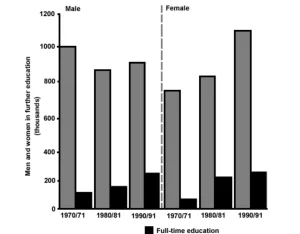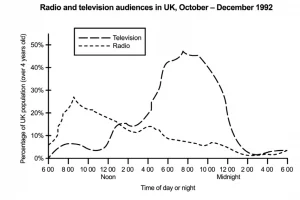How to Improve at IELTS Writing: Task 1 and Task 2 With Samples

Your writing ability tells a lot about your communication skills. How you articulate your thoughts with clarity and conviction shows that you can communicate effectively without causing any confusion. That’s why most English language proficiency tests have a writing section to test your comfort level with the language. IELTS, or the International English Language Testing System, is one such exam that tests your English proficiency through writing (apart from reading, speaking and listening). In this blog, we will learn how to improve at IELTS writing and score band seven and above.
What is IELTS?
IELTS is an English language proficiency test globally recognised for college admissions and employment in English-speaking countries. It tests your English skills on four parameters:
- Listening
- Reading
- Writing
- Speaking
IELTS has two versions:
- IELTS Academic for students who want to study in an English-speaking country
- IELTS General Training for professionals who wish to work in an English-speaking country
Also Read: IELTS Preparation 2025: Check Tips, Strategies & Resources
What is the IELTS Writing Test?
The IELTS Writing Test is a crucial element of the language proficiency test, which analyses your ability to express yourself in English through writing. The writing test shows you can produce ideas in a language instead of just receiving them.
It shows the examiner that you have mastery of English grammar, vocabulary, sentence structure and conventions.
Writing also shows that you can form and analyse coherent ideas in your mind and express them effectively through language.
In the IELTS Academic Writing Test, there are two tasks:
- IELTS Academic Writing Task 1 – Describe visual information
- IELTS Academic Writing Task 2 – Write a formal essay from a point of view
In the IELTS General Training Writing Test, there are two tasks:
- IELTS General Training Writing Task 1 – Write a letter in response to a situation
- IELTS General Training Writing Task 2 – Write a formal essay from a point of view
Writing Tasks for IELTS Academic and IELTS General Training are compulsory and must be answered. Together, you should complete both within 60 minutes.
Also Read: Benefits of IELTS Exam: Why Take the IELTS Test?
IELTS Writing Task 1 (Academic)
In this task, you have to describe some visual information, which could be in the form of a table, a chart, a graph or a diagram, in 150 words. You should only spend about 20 minutes completing the task.
According to the official IELTS website, you should write this section in an academic or neutral style. The tone can be semi-formal.
IELTS can penalise you if:
- Your answer is shorter than 150 words.
- Your answer does not relate to the writing task.
- You have used bullet points or notes.
- The writing shows plagiarism.
While IELTS cannot penalise you for writing over 150 words in Writing Task 1, spending too much time on it means you have less time for Writing Task 2, which has a bigger share in your Writing band score.
IELTS Writing Task 1 Sample
| 1. | The chart below shows the number of men and women in further education in Britain in three periods and whether they were studying full-time or part-time. Summarise the information by selecting and reporting the main features, and make comparisons where relevant. (Source: IELTS) |
 |
Also Read: What Is a Good IELTS Score? Full Guide
| 2. | The graph below shows radio and television audiences throughout the day in 1992. Summarise the information by selecting and reporting the main features, and make comparisons where relevant. (Source: IELTS) |
 |
What Skills are Tested in IELTS Writing Task 1
IELTS judges your ability to organise, present and compare data presented in Writing Task 1. It assesses your descriptive skills about a process, object, event, or sequence. The task checks whether you can effectively decode information given in a visual format and express it through writing.
IELTS Writing Task 2 (Academic and General)
In IELTS Writing Task 2, you must write about a given point of view or a problem. Think of it as an essay writing task about a specific topic.
In 250 words or more, you have to address the topic in a relevant manner without straying from the main point. For example, if the task asks you to write about “Should children be allowed to use mobile phones”, you should not write about the “ill effects of mobile phones.”
Like Task 1, Task 2 should be written in a neutral, academic style. You should not take more than 40 minutes to complete this task.
IELTS can penalise you if:
- Your essay doesn’t directly address the topic.
- Your essay lacks coherence.
- You use fewer than 250 words.
- You have used bullet points or notes.
- Your writing shows plagiarism.
IELTS Writing Task 2 Samples
| 1. | Children who are brought up in families that do not have large amounts of money are better prepared to deal with the problems of adult life than children brought up by wealthy parents. To what extent do you agree or disagree with this opinion? Give reasons for your answer and include any relevant examples from your own knowledge or experience. (Source: IELTS) |
| 2. | International tourism has brought enormous benefit to many places. At the same time, there is concern about its impact on local inhabitants and the environment. Do the disadvantages of international tourism outweigh the advantages? (Source: IELTS) |
What Skills are Tested in IELTS Writing Task 2
IELTS judges your ability to identify the viewpoint and present a relevant opinion about it. Like the other section, it tests whether you can form coherent ideas in response to a viewpoint and present them clearly using English. Writing Task 2 also assesses the diversity and richness of your vocabulary and your command of English grammar.
Note that Writing Task 2 carries more marks than Writing Task 1. Hence, you should avoid spending too much time on Task 1 (not more than 20 minutes) and focus enough attention on Task 2.
IELTS Writing Task 1 (General Training )
In this task, you have to write a letter responding to a situation such as making a request, explaining a situation or even asking for information. This section carries 150 marks and should be completed in 20 minutes.
According to the IELTS guidelines, the letter can be personal, semi-formal, or formal, depending on the situation explained in the task. It could be addressed to a friend, a manager, a landlord, etc.
IELTS can penalise you if:
- Your answer is shorter than 150 words.
- Your answer does not address all the points given in the task.
- You use bullet points or notes
- Your writing is plagiarised
- The tone or style doesn’t suit the situation or the person the letter is written for
What Skills are Tested in IELTS Writing Task 1 (General Training)
Through this section, IELTS tests whether you can write a coherent letter addressing the issue in the task. It checks if you can adapt the language according to who the letter is addressed to. Like the other tasks, it checks whether you can address the topic, form coherent ideas and express them clearly in English, apart from your grammar or vocabulary.
How to Improve at IELTS Writing
Before you set out to practice for the IELTS Writing Test, get a complete overview of both the writing tasks, what they entail and what they expect from you, the test taker.
Both tasks have specific asks from the test takers and should be approached accordingly.
IELTS Writing Task 1 Tips (Academic)
- Take time to analyse the information before writing.
- Paraphrase the question in the introduction using synonyms to demonstrate your vocabulary.
- Write an overview, giving a general summary of the main trends or stages given in the diagram.
- In the body paragraphs, write down your interpretation of the trends you can understand from the graphs or charts.
- Give space with paragraph breaks.
- Don’t give subheadings, bullet points, or a greeting at the beginning or a name at the end.
- Pay special attention to spellings and grammar. Review and edit before submitting.
IELTS Writing Task 1 Tips (General Training)
- Take time to understand the task: what’s the instruction; to whom should you send the letter.
- Identify the letter type so that you can modulate your tone and style accordingly. If you address the letter to a friend, keep the tone informal. If you address the manager, use a formal tone.
- Structure the letter with greetings, introduction, purpose of writing the letter and the complimentary close.
- Avoid bullet points at all costs.
- Ensure that all the ideas are well connected and flow logically from one another.
- Pay special attention to spellings and grammar. Review and edit before submitting.
- Pay attention to word count, ensuring that you don’t fall below the word limit.
IELTS Writing Task 2 Tips (Academic and General Training)
- Read the question carefully once or twice to identify the task type and instructions. Mentally note what angle to take.
- Jot down important points in a flowchart-like manner roughly. This will help you form your points and structure your formal essay.
- Write a clear and concise introduction by paraphrasing the the question.
- Avoid any slangs or frivolous words that will hinder the semi-formal or neutral tone of your essay.
- Stay on topic and do not stray.
- Don’t leave your essay dangling; tie up all the loose ends in the conclusion.
- Avoid bullet points at all costs.
- Ensure that all the ideas are well connected and flow logically from one another.
- Pay special attention to spellings and grammar. Review and edit before submitting.
- Pay attention to word count, ensuring that you don’t fall below the word limit.
Tips and Tricks for IELTS Writing
To excel at the task overall, follow these IELTS Writing tips and tricks to increase your band score.
- Familiarise yourself with the tasks and their specific asks.
- Understand the assessment criteria for each task. Give the examiners what they are looking for.
- Plan and prioritise; spend more time on Task 2 than Task 1.
- Always read the instructions thoroughly before starting. Identity the main components of the task and what they require from you. Don’t be in a hurry.
- Take practice tests with IELTS Writing samples. Use official IELTS material from British Council, IDP and Cambridge.
- Practice daily by dedicating time for both tasks.
- Simulate test conditions by writing in under 20 minutes for Task 1 and 40 minutes for Task 2.
- Use thesaurus to find synonyms for words and use them extensively in your writing.
- Get an instructor, friend or AI to grade your responses.
- Supplement with reading material from trusted sources like The Economist, New York Times, Washington Post, The Hindu and The Indian Express.
How You Are Scored for IELTS Writing Tasks
Trained and certified IELTS examiners score your writing tasks. They check your performance on each writing task. There are for criteria for the same:
-
- Task Achievement/ Response: How accurate you are in your response to the requirements of Task 1 (Achievement) and task 2 (Response).
- Coherence and Cohesion: How clearly, fluently and logically your organise your ideas and information with linking words, pronouns and conjunctions, etc.
- Lexical Resource: How rich your vocabulary is.
- Grammatical Range and Accuracy: How grammatically sound you are.
Frequently Asked Questions
How to get 8.5 in IELTS writing?
To get a score of 8.5 in IELTS writing, you must demonstrate a thorough understanding of the task at hand, use a wide range of vocabulary, organise ideas logically, make no grammatical or spelling errors, and not fall short of the word limit. You can achieve this by practising on sample IELTS writing tasks, understanding band checklists for scoring, reading sample IELTS writing and mimicking the styles of band 9 write-ups.
Is 7.5 IELTS Hard to Get?
A band 7.5 in IELTS is not hard to achieve if you begin your practice three months in advance. Familiarise yourself with the various marking parameters of IELTS. Work on grammar, cohesion and vocabulary to enrich your writing and up your scores. Use IELTS resources from the website to practice your writing. Go through sample writings for each band and try to mimic the styles of the band 7.5+ write-ups. Regular practice will help you understand areas where you lack, allowing you to target them specifically.
Can I Pass IELTS Without Preparation?
It all depends on how confident you are with your English language skills. If you are a native speaker, you may be able to get by with little practice; however, if English is not your first language, you may have to practice harder to understand the language conventions, grammar and vocabulary to pass IELTS. You have
Is 7.5 a good score in IELTS?
A band 7.5 score in IELTS is a very good score. It shows that you are fluent in English writing, speaking, listening and reading, indicating that you have a good understanding of the language. Many top universities admit students with a band 7.5 score and greenlight candidates for employment.
Can I crack IELTS in 15 days?
It depends again on how fluent you are in English. Native speakers who understand grammatical conventions, have a rich vocabulary and can read and write easily may be able to crack IELTS in 15 days and even score well. For a non native English speaker, IELTS needs at least 3 months of practice in writing, speaking and listening with official IELTS studying materials.



